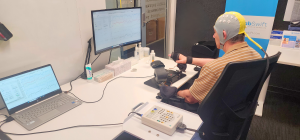
RehabSwift's Personalized Brain-Computer Interface Shows Promising Results in Stroke Rehab Published in PNAS Nexus
RehabSwift’s innovative system optimizes brain signals for personalized stroke recovery, significantly improving hand function and patient outcomes.
ADELAIDE, SA, AUSTRALIA, July 11, 2024 /EINPresswire.com/ -- A groundbreaking personalized brain-computer interface therapy, RehabSwift, significantly enhances hand mobility for stroke survivors. Strokes often lead to impaired hand function, presenting substantial challenges in daily activities. A team of researchers has developed and tested an innovative brain-computer interface therapy that translates imagined hand movements into real actions using a personalized algorithm and advanced bionic hands.The study involved twelve chronic stroke survivors from South Australia who had limited use of their arms but retained clear thinking abilities. Throughout 18 sessions, participants used the RehabSwift system, which included a special cap that measured their brain activity. Participants imagined moving their fingers, and this brain activity was then translated into actual finger movements by bionic hands providing both visual and physical feedback.
RehabSwift stands out due to its personalized approach. The system identifies the best part of the brain to focus on for training, selects the optimal brainwave frequency, and adjusts the timing between imagining a movement and receiving feedback. The RehabSwift system calculates these parameters for each user and accordingly adjusts its algorithms to provide personalized rehabilitation. This customized method ensures that the therapy is tailored to the individual’s needs, making it more effective.
Participants showed remarkable improvements in various areas, including overall arm function, hand movement tests, reaction times, and hand strength. These gains were maintained at follow-up assessments 4 ̶ 6 weeks after training. Importantly, many participants reported achieving their mobility goals as a result of the training.
“RehabSwift has the potential to revolutionize stroke rehabilitation by offering a tailored approach that meets the unique needs of each patient. Our results demonstrate significant and lasting improvements in hand mobility, showcasing the power of personalized brain-computer interface therapy,” said Dr Sam Darvishi, lead researcher and developer of RehabSwift.
According to the authors, these findings highlight the potential of brain-computer interfaces, especially the RehabSwift system, as powerful, personalized, and adaptable tools for stroke rehabilitation. The study showcases the innovative approach of using real-time brain feedback, personalised algorithms and advanced mechanical assistance to enhance recovery.
“Enhancing Post-Stroke Hand Movement Recovery: Efficacy of RehabSwift, a Personalized Brain-Computer Interface System,” by Sam Darvishi, Anupam Datta Gupta, Anne Hamilton-Bruce, Simon Koblar, Mathias Baumert, and Derek Abbott. (https://doi.org/10.1093/pnasnexus/pgae240)
MEDIA CONTACTS:
Name: Dr Sam Darvishi
Institution: RehabSwift Pty Ltd, ThincLab, The University of Adelaide, Adelaide, Australia
Email: sam@rehabswift.com
Phone: +61 450 214 545
Dr Sam Darvishi
RehabSwift
450214545398
email us here
Visit us on social media:
Facebook
X
LinkedIn
Instagram
YouTube
RehabSwift Explainer Video
EIN Presswire does not exercise editorial control over third-party content provided, uploaded, published, or distributed by users of EIN Presswire. We are a distributor, not a publisher, of 3rd party content. Such content may contain the views, opinions, statements, offers, and other material of the respective users, suppliers, participants, or authors.


